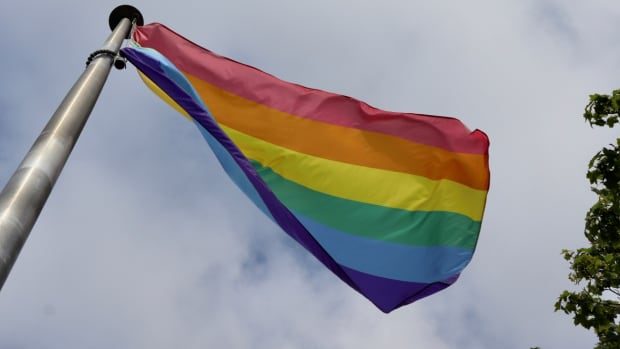Global Courant 2023-04-28 13:00:00
The head of a Pride commission in southwestern Ontario has filed a human rights complaint against the township of Norwich, alleging that its ban on advocacy group flags on its property and its refusal to recognize June as Pride month constitutes discrimination.
Oxford County Pride president Tammy Murray said she filed the Ontario Human Rights Commission (OHRC) complaint against the township, Mayor Jim Palmer and council members John Scholten and Adrian Couwenberg. These three members of the five-member council voted Tuesday to only fly civilian flags on township property and against recognizing Pride month.
“I don’t think I’ve been given a choice,” Murray said when he turned to the OHRC. “People from marginalized communities feel hurt, re-victimized, left out and do not feel their voices are being heard.”
Murray said Oxford Pride is looking for:
A formal written and oral apology from Norwich council officials in council chambers. A lifting of the ban on the Pride banners. For the council to paint a rainbow crosswalk. $50,000 in damages.
At this week’s council meeting, members voted 3 to 2 to fly only Canadian, provincial and municipal flags. The only other banners that are allowed to be installed on street lamp posts in townships are banners advertising downtown businesses or downtown beautification.
The original regulation, drawn up by Scholten in March, wanted only government flags to be flown. Last week it was amended to ban all advocacy group flags, including the Progress Pride flag. At the council meeting, the motion was again amended by removing the words “Progress Pride flags”.
The motion followed a series of thefts and vandalism of Pride flags last summer, after the council approved its business improvement organization to fly such flags.
Norwich City Council saw a large turnout of community members speaking both for and against the banning of Progress Pride flags on council property. On Tuesday, the council voted 3-2 in favor of the flag ban. (Isha Bhargava/CBC)
Murray filed the OHRC complaint earlier this week, but says she will amend it to include the $50,000 in punitive damages statement.
Scholten declined to comment, except that he was made aware of the human rights complaint through CBC’s call. Palmer and Couwenberg have not yet responded to CBC’s request for comment.
According to Toronto-based human rights lawyer Raj Anand, Murray’s complaint should show that Norwich’s LGBTQ+ community is being treated differently, either intentionally or through the effect on them of an apparently neutral ordinance.
“Some kind of compromise is needed”: lawyer
Scholten’s reasoning was that civilian flags best represent all groups of people and allow everyone to live together in harmony, regardless of their identity or beliefs. He said putting up Pride flags will only inspire other communities to request their own flags.
Anand, a former chief commissioner of the OHRC, said the township’s decision could be a violation of the provincial human rights code, even if it does not explicitly exclude a particular group.
“Banning all flags of interest groups as a means of saying ‘We don’t allow flags of any interest group and therefore you will not be discriminated against’ is more of a subtle argument for human rights discrimination, but the council may still be found that they have violated the human rights code,” Anand said.
Rainbow flags, a symbol of lesbian, gay, bisexual, transgender (LGBT) and queer pride and LGBT social movements, are seen outside the Stonewall Monument in New York City on June 7, 2022. (Angela Weiss/AFP/Getty Images)
“I understand that flying multiple different flags can be time consuming and costly for township personnel, but they could have developed a (rainbow) crossing or compromise instead,” Murray said.
A municipality is not required to comply with every request, but must consider, discuss and review alternatives and costs, Anand said.
“If a council cannot meet a group’s request because of undue adversity, meaning it is too costly or creates a health and safety problem, then it should consider another way to advance that group’s interest in equality – there is some sort of compromise is required.” he said.
Anand said it would be difficult for the municipality to claim unjustified hardship as there are constant requests for flags and banners.
In 1995, London faced a similar human rights case
Nearly two decades ago, the City of London, west of Norwich, faced a similar situation to the township, and was found to have violated the Ontario Human Rights Code.
In 1995, Diane Haskett, then Mayor of London, refused to proclaim Pride and would not wave the rainbow flag on City Hall, prompting the Homophile Association of London (HALO) to file a complaint against Haskett and the city.
Two years later, the OHRC ruled in favor of HALO and fined the mayor and city each $5,000. In 2018, Mayor Matt Brown formally apologized to the LGBTQ+ on behalf of the city by acknowledging the discrimination.
Pat Shanahan, who was a witness at the OHRC hearing involving London, said the situation in Norwich is giving him flashbacks.
“First of all, the city had set the precedent for flying these flags, so they had provided that service in the past,” he said. “We must remember that this is about minority rights. It’s always easy to do the popular thing, but it’s harder to do the right thing.”
Murray believes that much of the LGBTQ+ community does not feel safe in Norwich, so she hopes the council can do good to those community members.








